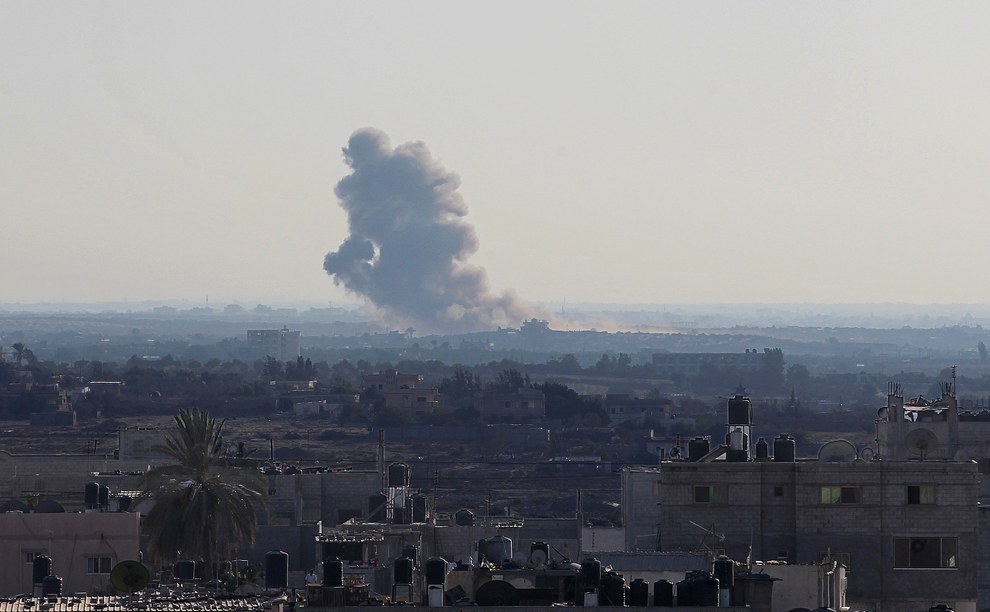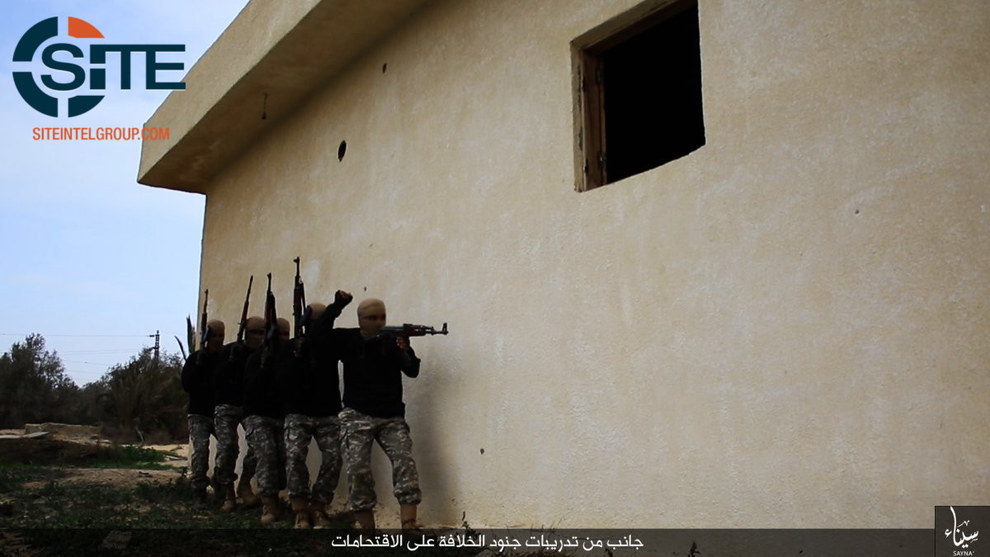http://www.buzzfeed.com/magedatef/this-is-what-life-is-like-for-egyptians-caught-in-a-war?utm_source=Sailthru&utm_medium=email&utm_campaign=New%20Campaign&utm_term=.wellEZe7G#.uvKJ4zgLM
Residents across towns and villages in North Sinai told BuzzFeed News they have become targets of both militant groups and the Egyptian army. posted on Mar. 7, 2016,
AL-ARISH, Egypt — When ISIS fighters torched 40 cars and trucks belonging to a garbage collection provider in North Sinai, they had a plan — to stop the collection of trash, so they could use the piles of rubbish to plant bombs.
Not long after the attack last month, Care Service was forced to shut down and let go of its 400 employees.
Mohamed Hassan, who worked for Care Service and was among those who lost their jobs, remembers the night when armed men in masks barged into the company compound, told the staff to sit down, and warned them they’d be shot if they so much as moved.
“Then they poured gasoline on the cars and torched them,” said Hassan (not his real name — he requested we use a pseudonym out of fears for his safety). “Then they fired gunshots in the air and fled.”
Just a few years ago, North Sinai was mostly known as a tourist destination, with its pristine beaches attracting visitors from around the world. But in recent years, it has become the battleground for an increasingly bloody confrontation between Islamist fighters associated with ISIS, and the Egyptian army, which has fought fire with fire.
Across towns and villages in North Sinai, Islamist fighters have destroyed the livelihoods of people like Hassan. But the Egyptian army has been equally destructive. Hassan described the moment Egyptian soldiers burst into his brother’s house and destroyed his farm while carrying out a search for militants.
“They could have simply searched the house and left, but they ruined everything on the farm,” he said. “Why do they insist on turning us into enemies?”
Residents of North Sinai who spoke to BuzzFeed News described how they have become the victims of a vicious war, trapped between radical Islamists on one side and the Egyptian state on the other. Today, many parts of the Sinai peninsula are under control of Ansar Beit al-Maqdis, a radical Islamist group that came to the forefront after the toppling of President Hosni Mubarak in 2011. Since then, the group has pledged its allegiance to ISIS — and changed its name to Wilayat Sinai, which means the State of Sinai — and even though the strength of the group is unknown, it has successfully carried out major terrorist operations in North Sinai.
Egypt’s government has responded by deploying thousands of soldiers — it has never revealed the exact number — and a senior military officer who spoke to BuzzFeed News on condition of anonymity estimated that around 2,000 soldiers have been killed in clashes with militants in Sinai since President Abdel Fattah al-Sisi took office and launched a crackdown on Islamists.
“Death is the only thing our children here see.”
Across the towns and villages in the Sinai, the army has set up checkpoints and they check residents regularly as they go about their daily routine.
“Those checkpoints do nothing but make movement of people more difficult,” said Mustafa, an elderly man at a cafe in al-Arish, the capital and the largest city in North Sinai. “An errand that used to take an hour now takes three to four hours. Everyone has to stand for a long time at the checkpoint because they suspect everyone.”
Until 2013, there were hardly any military operations inside al-Arish. Militia groups only targeted military checkpoints on major highways, and residents in the city weren’t bothered. But after Wilayat Sinai attacked the army’s largest headquarters in the region last year in January, killing more than 35 and wounding nearly 80 soldiers, the Egyptian military ramped up its aerial bombardment campaign. Since then, Islamist fighters in the towns of Sheikh Zuwayed and Rafah have fled and moved into al-Arish and targeted the military convoys within the city. “Now death is at every corner,” said Said al-Meteny, who used to run a clothing shop in al-Arish until the violence caused him to shut it down.
According to locals in North Sinai who spoke to BuzzFeed News, the majority of fighters in the province are originally from the Bedouin town of Sheikh Zuwayed, near the border with the Gaza Strip. Khaled, who is in his mid-forties and asked to be identified with a pseudonym because he has many relatives fighting for Wilayat Sinai, said the villages around Sheikh Zuwayed have become the main battlefield between the army and the Islamists.
“The Islamist forces are stronger and more prominent in southern parts of Sheikh Zuwayed,” he said. “It is difficult for the army to enter those villages with its heavy machinery and it has to resort to airstrikes and shelling.”

Said Khatib / AFP / Getty Images
Al-Lafitat, a small village in the southern side of Sheikh Zuwayed, was once lively with green olive groves and sheep farms. But it’s easy to see why Khaled now calls it a battlefield — al-Lafitat lies in ruins, its walls pockmarked from repeated shelling, and there are few signs of life.
A chieftain in the village, a tall man in his late fifties, agreed to speak to BuzzFeed News on the condition that he and the villagers were not identified because he feared retribution from the army. He said he would arrange a meeting with the local militiamen who fought for Wilayat Sinai.
On the way to meet the militiamen, the chieftain painted a grim image of the village. The army shells the entire village rather than specific targets, he said, because the militia are in control, with armed men patrolling the streets. “The militiamen often come to our houses and ask us to hide or store their weapons. If we refuse, they kill us. If we agree, the army will eventually find out and either arrest us or bomb our house,” the chieftain said. “Death is the only thing our children here see.”
Another villager, a local farmer, described how he lost his 12-year-old son after the army bombed his house with his two children inside. “It was 10 in the evening and there were no cell phone networks to call the ambulance or anyone to save my children,” he recalls. “I was carrying them in a neighbor’s car and driving toward Sheikh Zuwayed when officers at a checkpoint fired at us and said they would not allow us to pass through before dawn.”
After much pleading, the man said, the officers let him drive through. He said he tried calling one of the hospitals to send an ambulance but no one would respond. By the time he reached the hospital, his youngest son had died. “My son was not a terrorist and he for sure was not an armed soldier,” he said. “He was killed because someone decided that my house was a battlefield for their damn war.”

SITE Intel
About a mile into the desert, two men who covered their faces with scarves stood next to a hut, where the chieftain had arranged a meeting with the militiamen. One of those men was young and he hung an AK-47 on his shoulder. The other, who identified himself as Abu Mansur, looked slightly older and was unarmed. “We are all men of al-Baghdadi,” Mansur said, referring to Abu Bakr al-Baghdadi, the leader of ISIS.
Abu Mansur said members of Wilayat Sinai and ISIS regularly communicate with each other. The group has repeatedly claimed responsibility for bomb attacks and targeting of the Egyptian army since the confrontation in Sinai began. Most recently, the group claimed that it was behind the downing of Metrojet Flight 9268, which killed 224 people.
Since moving into al-Arish from Sheikh Zuwayed, Wilayat Sinai fighters have been known to target locals — residents have been accused of spying for the military and shot dead — and carry out operations in civilian areas. But Mansur repudiated such reports and accused the police and the army of attempting to drive a wedge between the people and ISIS fighters.
“The army of the infidels will definitely be defeated,” he said, referring to the Egyptian army under President Sisi. Mansour said the fighters in his group know the area well, and have faith and belief, which Egyptian soldiers lack — he said this would ensure their victory. He refused to comment on “victories” the army has claimed over ISIS but admitted his friends had become martyrs while fighting the army.
Last month, the government announced it would ban Egyptians under the age of 40 from entering North Sinai, after Ansar Beit al-Maqdas opened its doors to fighters from outside. But Mansur said the army’s decision to bar young people from entering Sinai would not stop them. “We will go to them,” he said.

No comments:
Post a Comment